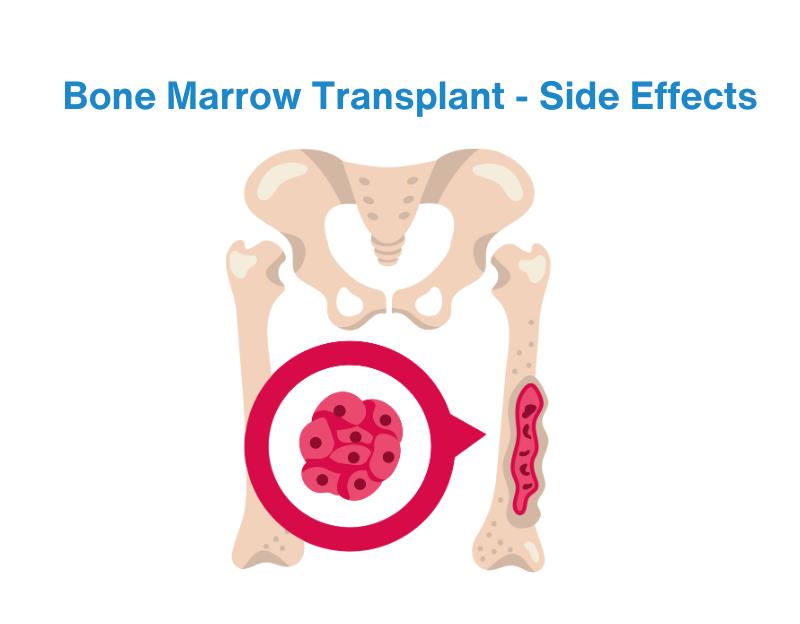
19 Dec, 2025
Feel free to reach out to us.

19 Dec, 2025

This article is medically reviewed by Dr. Amarnadh Polisetty, Consultant - Hematology and BMT Physician, HCG Cancer Centre, Vijayawada
A bone marrow transplant is a procedure of replacing the unhealthy bone marrow with healthy stem cells. The stem cells in the bone marrow produce blood cells. The bone marrow transplant aims to manage various diseases, including blood disorders and cancers.
There are different types of bone marrow transplants, depending on the source of stem cells.
In this type of bone marrow transplantation, the patient's own stem cells are used for stem cell transplantation. The doctors collect the stem cells of the patients. The patients undergo high doses of chemotherapy that may or may not be combined with radiation therapy.
The stem cells collected before chemotherapy are then infused back into the patients. Autologous bone marrow transplantation is generally used to treat myeloma and lymphoma.
Allogeneic bone marrow transplant uses stem cells from another person who may be related to or unrelated to the patient. Before transplantation, the patients undergo chemotherapy, radiation therapy, or both (conditioning treatment).
Conditioning treatment removes the remaining cancer cells from the body. It also reduces the effect on the immune system and avoids the rejection of transplanted stem cells.
Once the stem cells are infused into the patient’s body, they travel to the patient's bone marrow, grow, and produce blood cells. The process of stem cells traveling to the bone marrow and producing blood cells is known as engraftment.
A bone marrow transplant treats various conditions, including blood disorders and cancers. Some of the conditions that may require bone marrow transplant are acute or chronic leukemia, amyloidosis, aplastic anemia, germ cell tumors, Hodgkin’s or non-Hodgkin’s lymphoma, multiple myeloma, myelofibrosis, myeloproliferative disorders, and sarcoma.
A bone marrow transplant is a complex procedure. Patients who undergo bone marrow transplants may experience various side effects and complications. There are several reasons for developing side effects of bone marrow transplants.
The stem cell transplant procedure involves intense conditioning. The administration of high-dose chemotherapy with or without radiation therapy during intense conditioning destroys the healthy cells. It causes several side effects, such as oral sores, nausea, vomiting, compromised immune systems, and skin reactions.
The side effects of bone marrow transplants may also occur due to a compromised immune system that increases the risk of infections. Further, patients undergoing allogeneic stem cell transplantation have a higher risk for graft-versus-host disease, in which the host's immune cells attack the new stem cells.
The stem cell treatment side effects and complications include:
Some of the measures to manage the side effects of bone marrow transplantation are:
As one of the leading hospitals for cancer treatment in India, HCG Cancer Centre offers comprehensive diagnostic and treatment facilities for different types of cancer.
With the dedicated department for BMT cases, the hospital is made capable of managing the side effects of post-transplantation. The expert team at the hospital regularly monitors the patients and diagnoses side effects and complications.
Treatment is provided according to the symptoms. The doctors at the center offer a customized plan to manage the side effects. The hospital also has nutritionists who can create an appropriate diet plan that aids in faster recovery.
A bone marrow transplant replaces damaged marrow with healthy stem cells, often used to treat blood disorders and cancers. There are two types: autologous, using the patient’s cells, and allogeneic, using donor cells.
While it offers curative potential, the procedure poses risks like infections, graft-versus-host disease, and long-term side effects. Ongoing medical care and lifestyle adjustments are crucial for recovery.

Dr. Amarnadh Polisetty
Consultant - Hematology and BMT Physician
MBBS, MD (General Medicine), DNB (Clinical Hematology)
Dr. Amarnadh is an experienced hematologist and BMT specialist who is available for consultations at HCG Cancer Centre, a leading cancer hospital in Vijayawada. He is well-trained in the comprehensive management of pediatric and adult hematological and oncological disorders. His expertise extends to the management of thrombophilia disorders and the management of hematological disorders in cardiac OTs and cardiac ICUs. He is certified in National Cardiac Life Support (affiliated to the American Heart Association). He combines the latest evidence-based treatments with a compassionate approach to ensure that patients are well-informed and receive the best possible care.
To book an appointment with Dr. Amarnadh Polisetty, please click here.